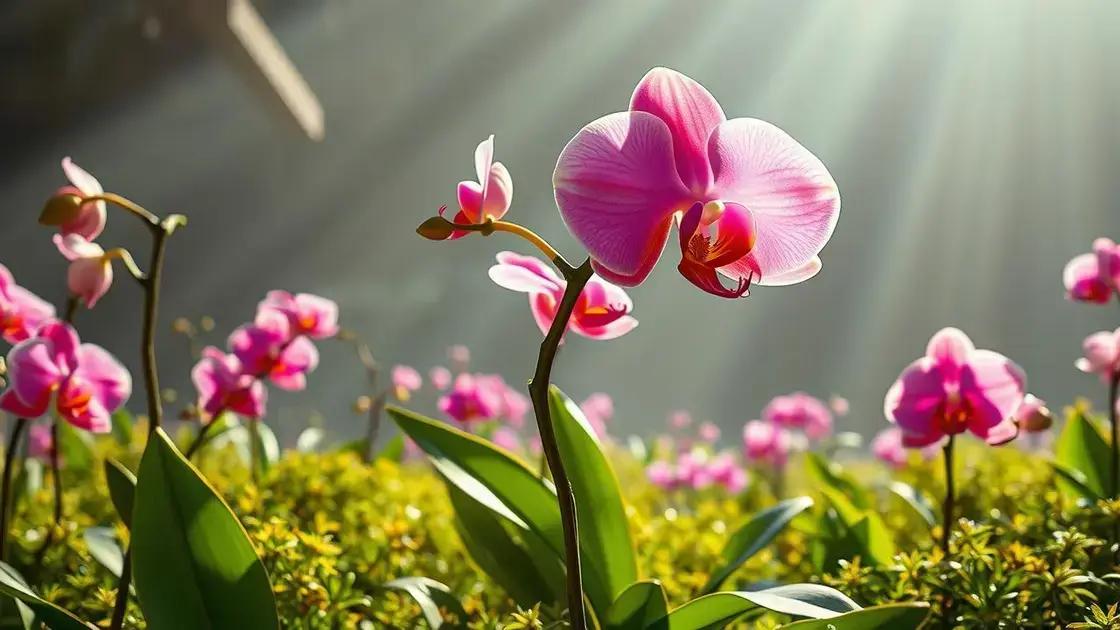How to take care of a orchid plant indoors might seem daunting, but with the right approach, it becomes an enjoyable experience. Wondering what it takes to ensure vibrant blooms and lush greenery? The following sections will guide you through discovering the core aspects that help your orchids flourish in your home.
Table of Contents
ToggleEssential watering schedule for indoor orchids
Essential watering schedule for indoor orchids is crucial for keeping your plants healthy and thriving. The right amount of water not only nourishes the roots but also ensures beautiful blooms.
Understanding orchid watering needs
Orchids, particularly those grown indoors, require a specific watering schedule that caters to their unique needs:
- Water less frequently than other houseplants.
- Allow the potting medium to dry out slightly between waterings.
- Be mindful of the humidity levels in your home.
When and how to water your orchids
Here’s a simple approach to effectively manage watering:
- Frequency: Water every 1-2 weeks, depending on the season and humidity.
- Technique: Water thoroughly until it drains from the bottom of the pot for proper hydration.
- Time of day: Water in the morning to prevent root rot from excess moisture overnight.
Signs of overwatering and underwatering
Being attentive to your orchid’s response is vital. Some common signs include:
- Overwatering: Yellowing leaves, soggy roots, or a foul smell from the potting medium.
- Underwatering: Dried leaves, shriveled pseudobulbs, or roots that appear grey and lifeless.
Water quality tips
Using the right kind of water can also impact your orchid’s health:
- Distilled or rainwater is ideal, as it is free from chemicals.
- If using tap water, let it sit for 24 hours to allow chlorine to evaporate.
For more tips on nurturing your indoor plants, consider exploring indoor gardening techniques. Remember, maintaining an effective watering schedule can transform your orchids into a stunning centerpiece of your indoor garden.
Optimal sunlight exposure for orchid health

Optimal sunlight exposure for orchid health is essential for ensuring that your orchids flourish. Proper light conditions not only facilitate photosynthesis but also enhance flowering and overall vitality.
Understanding light requirements of orchids
Different orchid species have diverse needs regarding sunlight. Here are the key factors to consider:
- Most orchids thrive in bright, indirect light.
- Too much direct sunlight can scorch the leaves.
- Specific varieties may require lower light conditions to flourish.
Best light sources for indoor orchids
Choosing the right light source is crucial for optimal growth:
- Natural sunlight: Position your orchids near east or west-facing windows for the best results.
- Grow lights: If natural light is limited, consider using full-spectrum grow lights.
- Monitor light intensity: Use a light meter to ensure your orchids receive adequate light levels.
Signs of inadequate light exposure
Pay attention to your orchids as they will signal if they are not receiving enough light. Common indicators include:
- Leaves turning yellow or dropping.
- Stunted growth or elongated stems.
- Reduced blooming or sparse flowers.
Adjusting light for seasonal changes
As seasons change, so will the amount of natural light. Consider these adjustments:
- Rotate your orchids to ensure even light exposure.
- Use sheer curtains to diffuse harsh sunlight in summer.
- For winter months, move orchids closer to windows as daylight decreases.
For more guidance on caring for your indoor plants, you can check out exploring indoor gardening techniques. Providing the right sunlight exposure is key to developing healthy and vibrant orchids.
Fertilizer application to boost orchid growth
Fertilizer application to boost orchid growth is vital for cultivating lush, vibrant plants. Understanding the right type of fertilizer and application method can significantly enhance the health of your orchids.
Types of fertilizers suitable for orchids
Choosing the right fertilizer ensures that your orchids receive essential nutrients. Here are some common options:
- Liquid fertilizers are ideal for quick absorption.
- Granular fertilizers release nutrients slowly, providing longer-term benefits.
- Organic options, like fish emulsion or seaweed extract, offer natural nutrients.
When to apply fertilizer
Timing your fertilizer application can lead to better results. Follow these guidelines:
- Growing season: Fertilize every 2-4 weeks during spring and summer when orchids actively grow.
- Less during dormancy: Cut back on fertilizer during fall and winter.
- After repotting: Avoid fertilizing for about a month to allow the roots to settle.
How to apply fertilizer effectively
Proper application techniques ensure that your orchids benefit fully from fertilizer:
- Always dilute fertilizers in water according to package directions.
- Apply during watering to help prevent root damage.
- Ensure the potting medium is slightly moist before application for better nutrient absorption.
Signs of nutrient deficiency
Be aware of the indicators suggesting your orchid may need more nutrients:
- Yellowing leaves can indicate nitrogen deficiency.
- Stunted growth or smaller blooms may signal a lack of phosphorus.
- Pale foliage often points to insufficient micronutrients.
For more insights on caring for your indoor plants, consider exploring indoor gardening techniques. Applying the right fertilizer can transform your orchids into stunning highlights of your indoor setting.
In conclusion
Caring for orchids indoors requires attention to various factors, including optimal watering schedules, sunlight exposure, and effective fertilizer application. By understanding the unique needs of your orchids and providing them with the right care, you can enjoy stunning blooms and healthy growth throughout the year. For further insights and tips on enhancing your indoor garden, don’t hesitate to explore more resources.

